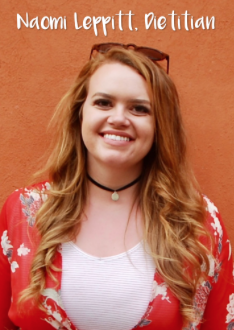A few people have been asking for tips as a student dietitian, so huge thanks to Naomi Leppitt, RD, for this guest post.

Why do I learn the science side?
I remember my first year of university in a lecture hall with hundreds of students doing all sorts of degrees. Why was I sat with students studying such different degrees – biomedical science, sports science, biochemistry? I just wanted to learn about good health through food! We were learning about Golgi apparatus and all the different types of microbial organisms, and so much chemistry! I thought to myself that it was all much too in depth. Of course, it was fascinating learning how intricately the body works on a cellular level, but I just couldn’t see the application to dietetics.
And then I went on my first placement. That chemistry? It helped me understand what it meant if someone’s blood biochemistry levels were out of range. All the microbiology helped me understand the importance of food hygiene, and helped me to give practical advice to patients who were immuno-suppressed. Golgi apparatus may not come up in my clinical conversations, but that cellular knowledge gave the grounding to be built on so that by final year we could understand the mechanisms and metabolism of different nutrients, and how diet directly leads to disease.
So, don’t just learn for exams and don’t burn your notes when they’re over! You will need to retain that knowledge for when you’re being challenged by a consultant to justify your rationale, or when you’re in clinic explaining the links between diet and disease.
It’s not all about weight loss!
Before I studied dietetics, and went on my first placement, I didn’t realise how much of the job is advising people to INCREASE how many high calorie foods they have.
Recommending cake? Who would have thought!
Weight management and healthy eating is just one part of dietetics. There’s so much more: building people up to help recovery from surgery, wound healing, strength gain and maintaining cognitive function. And there’s so many specialisms that make the career prospects vast, intriguing and a job you can keep growing and learning in.

Learning from others in the know:
Everyone gets so nervous about placements: it’s normal to feel nervous, but all the dietitians you meet are there to teach you. You are not expected to already know it all. You’re there to learn- and I found it beneficial to be supervised by lots of different dietitians: one, because I felt more part of the team, two, because each dietitian has different experiences and knowledge and will respond to patient’s questions in their own way. I picked up so many helpful phrases and tips for guiding consultations and recipe ideas too.
When picking placements, don’t pigeon-hole yourself and keep an open mind. I had 2 acute placements and by then I thought it was definitely for me: I loved being on the wards, and understanding complex medical conditions, and the biochemistry. I loved the problem solving, and the maths involved to calculate intakes, requirements, deficits. I thought I would hate a community placement. I thought it would be too slow-paced and not challenging enough. I didn’t get my final placement choice, and ended up in a Community placement and I loved it so much I got a job there when I graduated.

Community dietetics is different from acute, but it’s got its own characteristics: you do something different everyday: sometimes you’re out visiting nursing homes, or in a GP surgery running clinics, or attending inpatients (so you still get some acute exposure!) or doing group education. You meet so many different types of people with different dietetic needs, and it keeps your knowledge base broad, and tests your communication skills.
Learn as much as you can, because when you’re a Band 5, you don’t have your supervisor on hand to swoop in when you get stumped. Ask as many questions and take as many notes as you can, and the reflections do help you better your practice, because once you’re rushing around with a full caseload, there isn’t as much time to pause and think about what went well and where to improve.
The Misconceptions:
I think there’s misconceptions about what dietitians do- we get the label of telling people what to eat, but I have had conversations where I don’t tell people what to eat at all, because we are trying to get to the reason behind why they eat what they do. It’s not all about getting a patient’s plate to look like the Eatwell Guide: sometimes it’s addressing why they put food on their plates. Of course, we aren’t psychologists, and that’s not our remit or training, but it can’t be ignored. Dietitians don’t just address food but lifestyle too and so we get to advise people to rest, and destress and exercise, and advise to have less caffeine or alcohol!
We are health promoters on a holistic level.
Extras you can do to help:
My uni didn’t offer cooking lessons/ practical food classes, so do it in your own time if you can. It helps to be able to practically advise how to modify recipes. You may be a budding chef, but your patients may not even know how to boil an egg, so be prepared with advice for every level.

It might help to get a part time job or experience in a related field while you’re at uni: hospitality, caring, volunteering in hospitals or nursing homes or food banks, offering to do audits, writing articles for dietetics magazines, it all helps!
Get a mentor, if your uni has a mentorship programme, and talk with your professors. Ask them questions, email them, go to office hours, get feedback on your exams, ask for clarification about lecture content.
Lovely post Naomi. You’ve touched on some great points. Very encouraging for anyone else wanting to train in this field. I can see you being a great mentor following in Priya’s footsteps.
Aw thank you Susie! She’s been beyond supportive and kind!